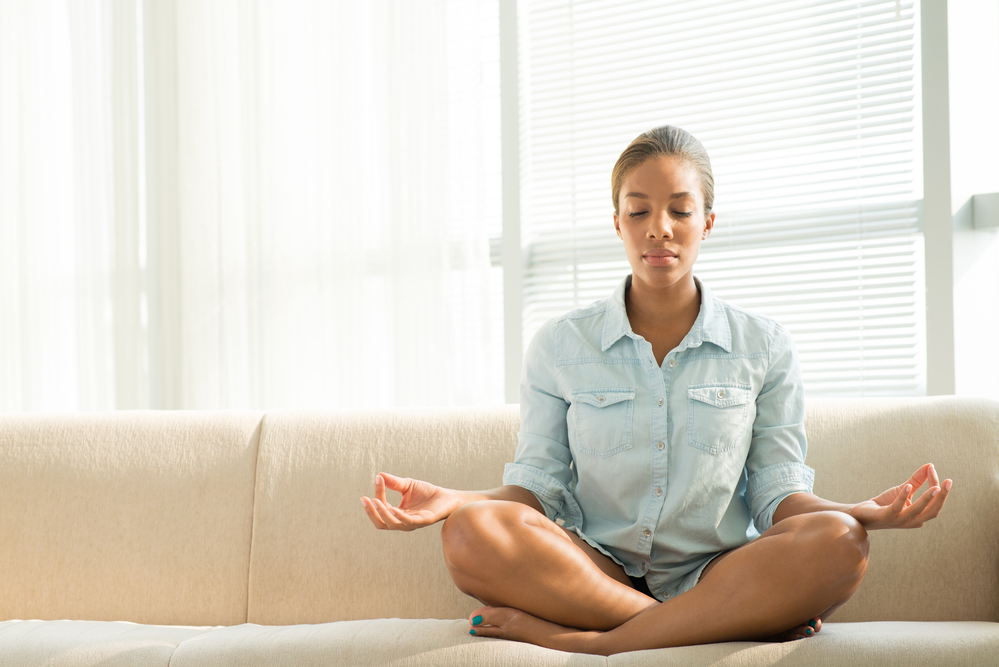If you’ve been to therapy in the past 10 or 15 years, chances are you’ve been told to meditate when you begin to feel distressed. Maybe you’ve tried focusing on your breathing but found yourself getting more and more worked up. Maybe you’ve started to get angry at the therapist—or friend, or family member—who swears by this practice. You conclude that it simply doesn’t work for you. Maybe it even made you feel worse.
Now, researchers may have discovered why.
In a new study, researchers led by Eric Tifft at the University of Albany found that the reason people chose to meditate—the intention behind their practice—predicted whether they experienced relief from their distress or not.
“Meditation practices have been marketed broadly to ameliorate human suffering. As such, individuals may seek out and use meditation to control or manage unpleasant thoughts and emotions. Emotion and thought control research suggests that meditation used in this way may potentiate unpleasant private experiences and contribute to negative outcomes,” the researchers write.
 According to Tifft and his co-authors, there are two main intentions that people hold when they decide to meditate. The first stems from the spiritual origins of meditation, such as Buddhism, and involves mindful acceptance—noticing thoughts and feelings, even negative ones, without judgment and without trying to control them. The second intention is the polar opposite: meditating to try to make anxiety, depression, or other negative feelings go away.
According to Tifft and his co-authors, there are two main intentions that people hold when they decide to meditate. The first stems from the spiritual origins of meditation, such as Buddhism, and involves mindful acceptance—noticing thoughts and feelings, even negative ones, without judgment and without trying to control them. The second intention is the polar opposite: meditating to try to make anxiety, depression, or other negative feelings go away.
This is the popular understanding of meditation in the Western world, which has divorced the practice from its spiritual roots and treated it as an add-on mental health intervention—something that will help your “symptoms” improve. In many cases, people are taught methods of meditation—like noticing your breath, for instance—but their goal for doing it is to reduce their anxiety, depression, stress, etc.
In the current study, Tifft and his colleagues have found that this focus on reducing symptoms undermines the success of the practice. And conversely, being open to those negative feelings and accepting them—as in the context of Buddhist meditation practice—actually does end up reducing distress.
The study included 103 college students who had previous experience with meditation. The sample was more diverse than usually found in psychological studies: less than half (45.9%) were White. A little more than half (58.2%) had used meditation to try to control their emotions; the other 42.8% had engaged in meditation with a mindset of openness/acceptance. (Only five students did not fit into these categories, reporting that they held both intentions; they were not included in the analysis.)
The researchers compared the two groups and found that those who were trying to control their emotions had higher distress:
“Individuals who endorsed using meditation for experiential control reported greater anxiety, worry, depression, and negative affect, and lower trait mindfulness relative to their acceptance‐guided meditating counterparts.”
The researchers also found that the perception of distress—not the severity of anxiety or depression itself—predicted intention to control rather than acceptance.
The researchers determined this because scores on the State‐Trait Inventory for Cognitive and Somatic Anxiety and Beck Depression Inventory did not predict whether people were trying to control their distress or accept it—once their perception of how problematic it was to have unpleasant emotions was added to the equation.
Because of the study design (cross-sectional), it is not possible to infer causality. The researchers acknowledge this limitation and are quite clear about the three possible interpretations of their results.
One explanation is that people who believe distress is problematic turn to control-based meditation rather than focusing on acceptance. It doesn’t seem to work, though, since these participants still reported worse distress.
The second explanation is that meditation focusing on control actually makes distress worse because it makes people focus on the problem and feel hopeless when meditation doesn’t solve it.
The third explanation combines the two: people who perceive negative experiences as problematic focus on controlling these feelings, which makes it worse.
The researchers add that “these findings are consistent with research suggesting that deliberate and effortful control of unpleasant private events can be ineffective and is associated greater psychological suffering.”
One implication: Therapists might want to focus on teaching acceptance before introducing meditation techniques.
In a blog post on Medium about the study, Steven Hayes—noted psychologist and creator of Acceptance and Commitment Therapy—calls out the prevailing shallow notion of meditation and refocuses attention on the spiritual context of the practice:
Note to the wonderful world of fast-food meditation: contemplative practice is NOT about getting rid of your experiences. It’s about anchoring yourself so that you won’t be swept away, and remain steady and present even in the presence of rain, thunder, and crashing waves. As the recently passed monk and peace activist Thích Nhất Hạnh put it, “In mindfulness, one is not only restful and happy but alert and awake. Meditation is not evasion; it is a serene encounter with reality.”
****
Tifft, E. D., Underwood, S. B., Roberts, M. Z., & Forsyth, J. P. (2022). Using meditation in a control vs. acceptance context: A preliminary evaluation of relations with anxiety, depression, and indices of well‐being. Journal of Clinical Psychology, 1-15. https://doi.org/10.1002/jclp.23313 (Link)















“The third explanation combines the two: people who perceive negative experiences as problematic focus on controlling these feelings, which makes it worse.”
Meditation to self help through the hell of criminal psychiatry’s fallout, which permeates all forever, does not help. I had to quit subscribing to free meditations from a couple of life style gurus. It was pissing me off too much.
The only thought I can came up with spiritually is that I am suppose to take any one good moment and let it erase all the pain and damage that continue to flow unabated from the snowball of negative effects of criminal psychiatry in my true story. Which is too much to ask. So rarely am I in the mindset to let it all go and meditate. The best I can do is consciously breathe in and out and few times letting things go for seconds at at a time. Before reality strikes.
https://ginafournierauthor.com/
Report comment
Of course, mindset matters when you meditate. Hunger matters when you eat. Thirst matters when you drink. Fatigue matters when you sleep. Respiration matters when you breathe. Sound matters when you hear. Light matters when you see. Odor matters when you smell. Sex matters when you procreate. SO OF COURSE YES MINDSET MATTERS WHEN YOU MEDITATE. Mindset matters when you eat. Mindset matters when you drink. Mindset matters when you sleep. Mindset matters when you breathe. Mindset matters when you hear. Mindset matters when you see. Mindset matters when you smell. Mindset matters when you fuck. So of course yes mindset matters in your life. And there is no better mindset than calm acceptance of both the doing, and the non-doing parts of your life. Even a schoolkid already knows what fraudster pseudoscientific psychiatrists still haven’t fully figured out yet!
Report comment
This is the popular understanding of meditation in the Western world, which has divorced the practice from its spiritual roots and treated it as an add-on mental health intervention—something that will help your “symptoms” improve. In many cases, people are taught methods of meditation—like noticing your breath, for instance—but their goal for doing it is to reduce their anxiety, depression, stress, etc.
Report comment
I think one has to consider how severe the psychological problem is. If it´s not too severe then positive thinking, acceptance and meditation might be the best course. However, that´s not going to cut it for a severe psychological problem. When you have been in a lot of psychological distress yourself, you have an idea how much distress others are in given what they say and how they act. I have seen many people who were in extreme distress but carry on. People are willing to live with extreme distress. However, still there are many suicides. I don’t think that´s because some people are weak. I think it speaks to how serious the psychological distress can be. I say never assume what you experience is as bad as it gets. I think any therapy need input from the person suffering on whether it would be helpful because he or she knows the most about the condition they´re struggling with.
Report comment